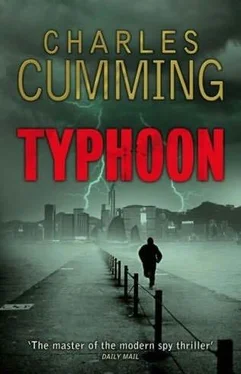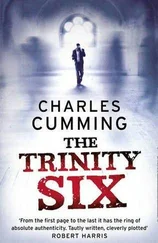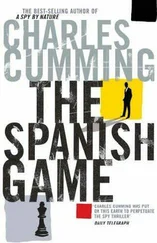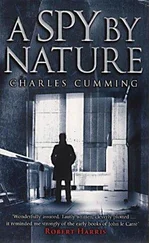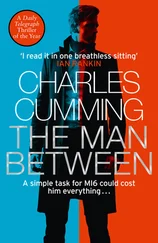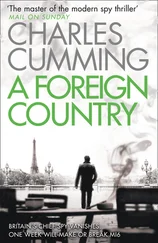Charles Cumming - Typhoon
Здесь есть возможность читать онлайн «Charles Cumming - Typhoon» — ознакомительный отрывок электронной книги совершенно бесплатно, а после прочтения отрывка купить полную версию. В некоторых случаях можно слушать аудио, скачать через торрент в формате fb2 и присутствует краткое содержание. Жанр: Шпионский детектив, на английском языке. Описание произведения, (предисловие) а так же отзывы посетителей доступны на портале библиотеки ЛибКат.
- Название:Typhoon
- Автор:
- Жанр:
- Год:неизвестен
- ISBN:нет данных
- Рейтинг книги:5 / 5. Голосов: 1
-
Избранное:Добавить в избранное
- Отзывы:
-
Ваша оценка:
- 100
- 1
- 2
- 3
- 4
- 5
Typhoon: краткое содержание, описание и аннотация
Предлагаем к чтению аннотацию, описание, краткое содержание или предисловие (зависит от того, что написал сам автор книги «Typhoon»). Если вы не нашли необходимую информацию о книге — напишите в комментариях, мы постараемся отыскать её.
Typhoon — читать онлайн ознакомительный отрывок
Ниже представлен текст книги, разбитый по страницам. Система сохранения места последней прочитанной страницы, позволяет с удобством читать онлайн бесплатно книгу «Typhoon», без необходимости каждый раз заново искать на чём Вы остановились. Поставьте закладку, и сможете в любой момент перейти на страницу, на которой закончили чтение.
Интервал:
Закладка:
“Two months before the Tiananmen massacre there was a demonstration in Urumqi. A sit-in by students, partly in support of their comrades in Beijing, but also as a religious protest at the depiction of Muslim sexual customs in a book circulated throughout the country. This demonstration became a riot, Mr. Richards, a riot in which Communist Party headquarters in the capital was attacked and more than two hundred police injured. We now look back on it as a mistake, because it confirmed in Beijing their worst fears about the separatist movement.” Joe noted the “we” here, the inference that Wang had been directly involved. “As the Soviet Union broke up, as the Islamic border nations began to assert their authority once more after years of oppression under communism, the Chinese government reverted to its hardline stance on Xinjiang. Islam was once again viewed as a threat to the Republic. Mosques that had only recently been rebuilt were destroyed. Those who attended study meetings to learn more about the Koran were arrested and thrown into prison. The Arabic language was once again banned. Matters became so serious that one of my students, Yasin, told me that his father, who worked in a government office in Karamay, had been warned that he would lose his job if he attended daily prayers. During Ramadan, the police actually spied on certain individuals in the Uighur community to ensure that they were prevented from observing the fast. Can you imagine such a humiliation? How would the good citizens of Iowa, or of Liverpool, feel if they were forbidden to practise their faith? In some areas, women were punished for wearing headscarves. Even devout Muslims who denied themselves alcohol in observance of sacred custom were forced to drink maotai by Communist Party officials. This has been the reality of China in the last decade, Mr. Richards. This has been the reality of the country to which you will soon hand over your precious Hong Kong.”
“And what has been your role during this period?” Joe was still trying to do his job, still trying to suck out the secret.
“Do you know what a meshrep is?” Wang asked, apparently evading the question. Joe said that he did not. “A meshrep is a traditional form of gathering for young people in Xinjiang. These youth groups existed for positive reasons. To revive Islamic traditions, for young men to recite poems, to sing music and so on. You would think of them in the West perhaps as a community or social project, where problems of alcohol or drug abuse within the population are openly discussed with a view to improving the lifestyles and conditions of all young Muslims throughout the region. The first of these meshreps was revived in the city of Gulja, in Ili Prefecture, a city known to the Han as Yining. Within a few years there were dozens of them throughout Xinjiang, perhaps as many as four hundred, and all established with the strict agreement of the provincial government. Because what could be wrong with this? Young Uighur people trying to solve their own problems and, at the same time, revive their traditions in a sensible fashion.”
“But the authorities cracked down?”
“Absolutely.” A sheen of sweat had appeared on Wang’s forehead, which glistened in the low light of the room. “In 1995 it was declared that the meshreps were cover organizations for separatist radicals seeking to undermine the Motherland. They must be closed down, their leaders arrested. This was the paranoid state of our government in Beijing, who cannot sleep in their beds for fear of an uprising, for fear of an Eastern Turkestan. Four students from a meshrep in Kashgar were subsequently arrested in that year for allegedly discussing political and human rights issues at a birthday picnic. A picnic. Beijing has informers at every level of Chinese society and they had mistakenly trusted one of their own friends, who had reported them. These young men were then accused of being counter-revolutionaries and sentenced to fifteen years in prison. When one of them appealed to the People’s High Court, his sentence was actually increased by the judge, who accused him of wasting the court’s time. It is a situation that Kafka would recognize, no?”
Joe remained still.
“All of these many issues have come to a head in the last two years. The Uighur people were tired of racial abuse, tired of discrimination from the state, tired of sending their children to schools where they were obliged to write sitting on the floor because of a lack of desks and chairs. Unemployment is running so high among Uighurs in Xinjiang that the sons and daughters of proud Muslims have been obliged to turn to crime, even to prostitution, in order to provide for their families. Of course this only deteriorates their image in the eyes of the Han men who use up these women for sex and then discard them like old bones.” Joe noticed that Wang’s voice was gradually growing louder, his rhetoric increasing to a politician’s intensity. “Let me now tell you that when thousands of Uighurs gathered in Yining in February of this year to make a peaceful protest, to demand better jobs, better working conditions, they were gunned down by armed police.”
Joe started forward. “Gunned down? What do you mean?”
“I mean what I say.” Wang looked angry, as if Joe had questioned his integrity. “I mean that the police beat them with sticks, they used tear gas, they attacked them with dogs. Those with cameras or recording equipment who attempted to witness what was happening had these items confiscated. And as the people saw what was happening, the riot exploded.”
“And this is when the shooting began? This was in Yining two months ago?” Finally Joe had sight of the product, another Tiananmen that all of his veteran colleagues appeared to have missed.
“That is correct. We estimate that four hundred people were killed, thousands more arrested. The jails became so full that prisoners were taken to a sports stadium on the outskirts of the city, where they were obliged to live for days without shelter in the snow. The police hosed them with water cannons to make their situation worse. Some froze as a result. Many lost hands and fingers through frostbite.”
“None of this has been reported in the West,” Joe said, a statement which he believed to be true. Had they all been so wrapped up in the handover, in Patten’s demo cratic reforms, that they had ignored mass slaughter in China? He was witnessing, more or less for the first time in his career, the operational limitations of Western intelligence. With all their money, all their resources and know-how, SIS and the CIA had been blindsided by a massacre in China. Joe thought that he should be seen to write something down, to give Wang the impression, however false, that the safe house was not wired for sound. But the professor was in the sweat of a sustained revelation, apparently paying little attention to how Joe was behaving.
“A curfew was imposed,” he said. “You must have learned of this. All airports and railway stations in Xinjiang were shut down for weeks. All foreign journalists were expelled from the region. The entire area was sealed. This is what they do in China when they have a problem. Nobody comes in, nobody gets out. In the wake of the Yining riot, house-to-house searches were conducted and another five thousand arrests made. Five thousand. And at the end of this, thirty-five of the so-called ringleaders were sentenced to death. They were taken to the outskirts of the city and simply shot through the back of the head.” Wang joined two fingers on his right hand and stabbed them into the base of his neck. Bang. “Of course these bodies were never returned to their families, just as the parents and relatives of the thousands of Uighur men and women who have been illegally imprisoned on false charges in the past several years have no idea where their loved ones are being held. And after the executions, as if to taunt the other prisoners, to make a spectacle of them, other so-called ringleaders were then paraded through the streets of Yining at a mass sentencing rally, already so drugged and physically damaged by their brief experience of prison that many of them, exposed in open trucks, were unable to stand or even to communicate with the crowd. I saw this with my own eyes, Mr. Richards, because I happened to be in Yining for a conference. I saw that their hands and feet were bound by wire as they knelt in the trucks. Many of the prisoners had been forced to wear placards around their necks, proclaiming their crimes, their sins, like something from medieval times. When one of the prisoners found his strength and shouted a slogan against the Communist Party, in full view of the crowd he was forced to the ground and beaten around the head by two policemen. I saw this with my own eyes.” Wang’s voice briefly tightened to an enraged pitch. “A gag was then forced into his mouth to prevent him from shouting further. When certain supporters in the crowd complained about this, they too were arrested by plain-clothes officials who had surrounded them.”
Читать дальшеИнтервал:
Закладка:
Похожие книги на «Typhoon»
Представляем Вашему вниманию похожие книги на «Typhoon» списком для выбора. Мы отобрали схожую по названию и смыслу литературу в надежде предоставить читателям больше вариантов отыскать новые, интересные, ещё непрочитанные произведения.
Обсуждение, отзывы о книге «Typhoon» и просто собственные мнения читателей. Оставьте ваши комментарии, напишите, что Вы думаете о произведении, его смысле или главных героях. Укажите что конкретно понравилось, а что нет, и почему Вы так считаете.
